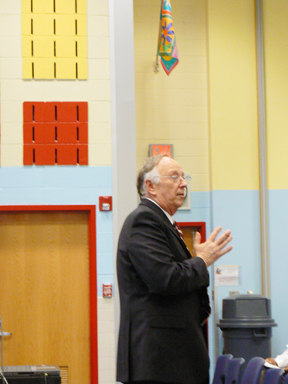Schools Superintendent Cynthia Randina and School Business Administrator Edward Walkiewicz presented the proposed budget for the 2009-2010 school year at a Secaucus Board of Education meeting on March 30.
The total projected budget is expected to be just over $35 million, a figure that includes grants and debt service. The portion of the budget to come from Secaucus taxpayers is $33.23 million, a 2.46 percent increase over this school year’s budget.
If that tax levy is approved by voters during the April 21 school board election, the average assessed home will see an increase of $5.81 a month, or $69.72 a year. The average single family home in Secaucus is assessed between $150,000 and $155,000.
In Secaucus, 95 percent of the school budget comes from property taxes, according to Walkiewicz, largely because the town doesn’t get a lot of state aid.
He explained why.
“First, the state sees you people as rich,” Walkiewicz told parents and teachers who attended the presentation last week. “Second, Secaucus gets a lot of ratable [taxpaying properties]. Therefore, we only get $1.6 million from New Jersey [in state aid]. That has been the case for several years, and it isn’t likely to change any time soon.”
What taxpayers get for their money
“We want to prepare our students academically, socially, and emotionally,” Randina said during the presentation. “When our students graduate from the high school, we want them to be able to contribute to the community, to the society. We identify good business trends and we want our students to acquire skills so they can function in the real business world.”
Randina said the curriculum throughout the entire school system is being updated to meet new federally mandated reading and math standards, and she added that some elements of the budget reflect changes in such state or federal mandates.
Other curricula are being revised to better meet the changing needs of students. For example, the high school math curriculum will be revised next year to integrate basic algebra, algebra 1, and calculus. The district will develop an eighth grade honors curriculum. And new teaching technology that is currently being tested on a pilot basis will be expanded to additional grade levels.
Several teachers at the high school have been certified, or are in the process of being certified, through New Jersey Institute of Technology to teach college-level courses so that seniors can take advanced classes for credit without leaving the school district.
Four new teaching positions will be added next year: a new world language teacher in the Middle school, a Middle/High School math teacher, a high school science teacher, and a part-time dance and drama instructor.
The Secaucus school district has also enhanced its arts program at a time when many districts are cutting and eliminating such programs.
“Can we afford it? Yes we can.” – Edward Walkiewicz
________
“Now, I know people will ask, can we afford it,” Walkiewicz said. “The answer is, yes we can.”
Cost containment
Randina and Walkiewicz made a special point of drawing attention to efforts by the school district to save money and curb spending.
Since health insurance is among the biggest expenses the school system must pay for, Walkiewicz said the district is trying to contain costs in this area by seeking more competitive health care proposals. The school administration has also introduced an incentive program to get
employees to use a spouse’s or domestic partner’s health insurance instead of the district’s benefits. Through the program, employees are given small payments when they use their partners’ health insurance. Walkiewicz explained that this incentive program has helped save the district money.
This year the school district also has been aggressive in its attempts to verify the residency status of students in the system.
“There are 50 students who are currently under investigation for attending school without the proper registration and residency documentation on file,” Randina said.
Randina added that the school district is prepared to bill nonresident families for tuition costs.
“We’re not going to tolerate a non-resident attending school in our district,” Walkiewicz noted.
Other cost containment measures include sharing services and resources with the town of Secaucus and participating in cooperative bidding programs.
Long-term, the school district is also exploring ways to save energy through solar energy options.
Reach E. Assata Wright at awright@hudsonreporter.com.
